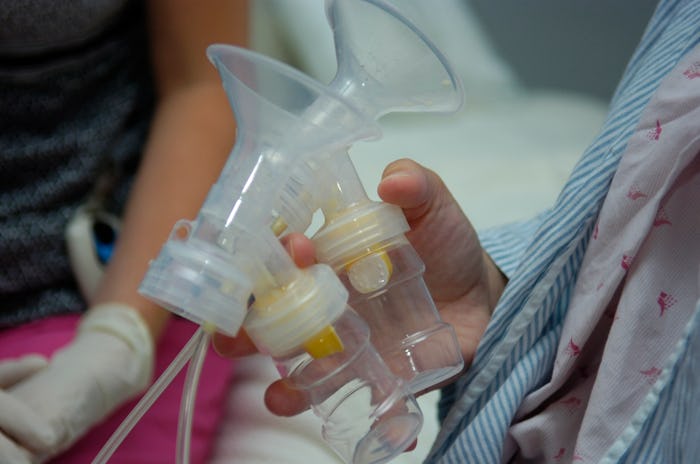Breastfeeding

Should You Bring Your Breast Pump To The Hospital? Here's The Deal
Here’s what you need to know about breast pumps when you give birth.
When planning to deliver a baby, one of the many things on your “must pack” list might be a breast pump. But is that overkill? Should you really bring a breast pump to the hospital? It seems like the type of tool a hospital would have at the ready for a new mom to use. Romper asked experts to find out if it’s necessary to secure a breast bump in advance of heading to the hospital.
Should I bring my breast pump to the hospital?
If you’ve never delivered a child before, you might have no idea whether you’ll breastfeed or use formula. And given the current formula crisis, breastfeeding might be your ultimate plan, at least initially. So it’s no wonder many patients are concerned about a need to buy a breast pump in advance.
But you don’t necessarily need to do so, says Mary Lou Kopas, CNM, ARNP, Chief of Midwifery at UW Medical Center Northwest Midwives Clinic.
“Yes, hospitals have pumps for patient use when they are inpatient for whatever might come up, such as a baby in the NICU unable to breastfeed yet,” she explains. So while you’re on the property of a hospital, if you need to pump, they have you covered. But keep in mind, this will likely be a hospital-grade pump. This term refers to pumps designed for individuals with medical issues affecting their breastfeeding, for instance the aforementioned baby in a NICU or, say, mastitis, a nasty duct infection. That said, you can’t necessarily take said pump home. “Most hospitals do not give out pumps to go home, but can arrange for a rental pump to be delivered the day of discharge,” Kopas explains. In addition, any parts attached to an in-hospital pump will be yours to take home. That includes the attached bottles, plastic lines, and flange.
The rental pump is a great alternative, but keep in mind, everyone’s insurance coverage is different. “And it could cost as much as $300 to use,” says Amanda Green, an RN and IBCLC with Orlando Lactation and Wellness Services.
Every pregnant person gets a pump
And every person considering having a child should be well aware of this: “Since the Affordable Care Act, aka Obamacare, all pregnant people get a purchased pump covered by their insurance — it's mandated,” she says. The best way to figure out how to get yours, is to reach out to your insurance company to find out what they offer and place your order. Note that your insurance may offer a variety of options, for instance an electric pump versus a manual pump. Keep in mind the work you’ll need to do to keep your baby fed and how a manual pump may impede that.
Because of the Affordable Care Act rule, Kopas says that nowadays most people already have a good pump at home and do not need a rental from the hospital. “If baby is healthy and term, the pump is not typically needed for at least a few weeks,” she says.
Should I bring formula to the hospital?
The other feeding factor that is top of moms’ minds right now is the dangerous formula shortage. With parents scrambling to get their hands on formula, you might wonder if that’s another thing to add to your hospital packing list.
Fear not. The hospital has that covered for you as well.
“We have formula at the hospital,” Kopas assures anxious parents. “I think people should buy formula only if needed and resist the urge to stockpile,” she adds. Kopas suggests that if parents are planning to formula feed, they should buy a small amount and keep it at home. Green agrees. “We’ll send them home with a small amount, but that may not be the case with every hospital, so you should check with your care provider,” she says.
“If they are breastfeeding and baby is term, the chance of them needing to give formula is pretty small, and usually would be just for a few days,” she adds. Another thing to consider is donor milk as a means to feed a new baby.
“Many hospitals also have a donor milk program for babies whose mothers are not making enough milk. For premature infants, getting human milk instead of formula can make a huge difference in their health outcomes (meaning they gain and grow faster and are less likely to have complications such as necrotizing enterocolitis),” Kopas says.
Sources interviewed:
Mary Lou Kopas, CNM, ARNP Chief of Midwifery at UW Medical Center Northwest Midwives Clinic
Amanda Green, an RN and IBCLC with Orlando Lactation and Wellness Services